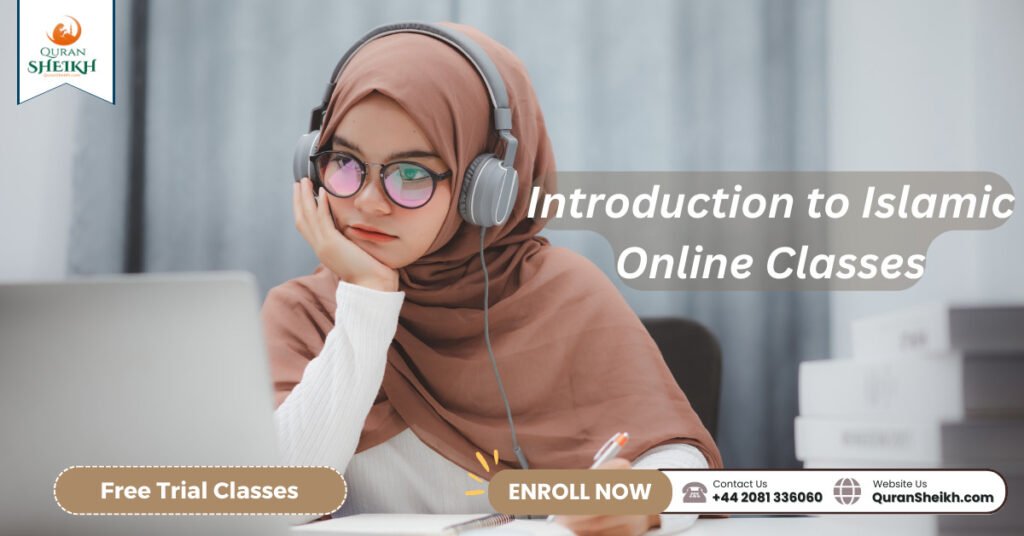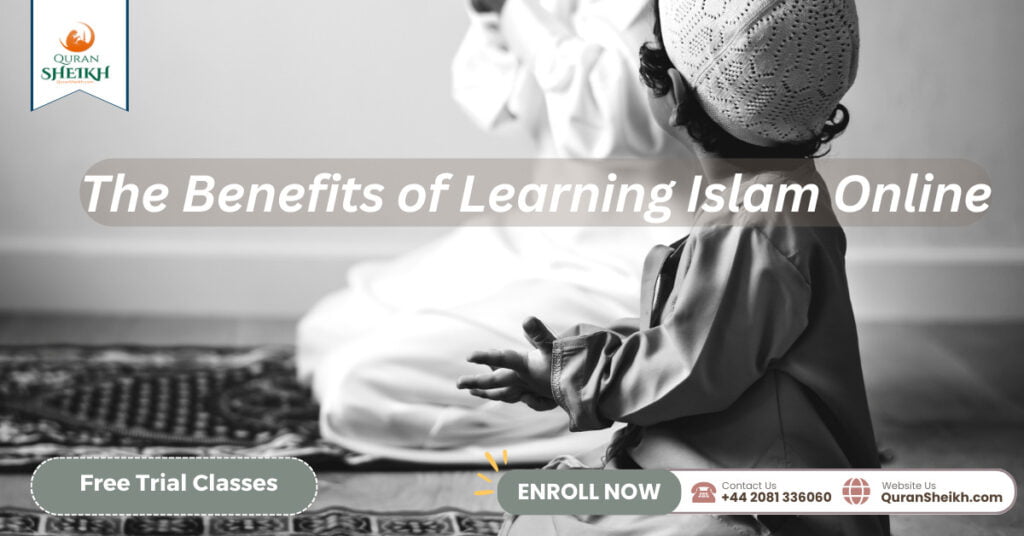In recent times, Islamic Online Classes have gained increasing popularity due to their affordable, convenient, and flexible structure. Everyone can learn about the Quran, Hadeeth, Fiqh, and Islamic history with this curriculum. It’s inclusive for all ages and backgrounds.
Muslim students can take high-quality Islamic courses and programs from home using online learning platforms.
This article explores the benefits of Islamic online classes, the challenges they face, and the future of Islamic education through online learning.
Join thousands of Muslim Families who love learning Quran, Arabic and Islamic Studies from the comfort of their Homes.
Introduction to Islamic Online Classes

Mosques, madrasas, and Islamic centers have traditionally been the primary institutions for imparting Islamic education – a crucial aspect of the Muslim faith. Thanks to advancements in technology, online classes have made Islamic education more accessible.
In this article, we will delve into the world of Islamic online classes, their popularity, benefits, and the comprehensive curriculum they offer.
What Are Islamic Online Classes?
Islamic online classes are courses offered online that teach various subjects related to Islam and the Quran. Qualified Islamic scholars and teachers provide students around the world with structured, interactive courses.
The classes suit students of any age or skill level because they may be accessed from anywhere at whatever time they choose.
Why Are Islamic Online Classes Popular?
Islamic online classes have become increasingly popular due to their accessibility and flexibility. The convenience provided by online learning allows students to learn from home at their preferred speed.
Online classes have also made it easier for those living in areas where there are no Islamic centers or qualified Islamic scholars to access quality education. Moreover, due to the pandemic, online learning has become customary, prompting a surge in individuals pursuing Islamic classes online.
The Benefits of Learning Islam Online

Flexibility and Convenience
The convenience and flexibility of studying Islam online make it one of the most significant advantages. Pupils can advance at their desired pace and on a schedule that suits them, all without having to commute to a physical location.
Diversity of Course Offerings
Another advantage of learning Islam online is the diverse range of courses available. Online learning platforms provide access to courses like Quranic studies, hadeeth studies, fiqh studies, tafseer, Arabic language, Islamic history and beyond. Individuals have the option to select classes that meet their personal interests and requirements.
Cost-Effectiveness
Online Islamic classes are typically more cost-effective than traditional classes, as they do not incur the same overhead costs. Furthermore, learners are relieved from the necessity to invest on commuting, lodging, and other expenditures that come with physical classroom attendance.
Quran Memorization Course Online with an Arab teacher with 30% Off
Islamic Online Classes: A Comprehensive Curriculum

Quranic Studies
Islamic education is incomplete without Quranic studies, and a comprehensive curriculum that covers various aspects of Quranic studies is available through online classes. Comprehending and deciphering the Quran, its linguistic structure, and regulations for recitation are all part of this.
Hadeeth Studies
Hadeeth, or the sayings of the Prophet Muhammad (peace be upon him), are a significant source of Islamic knowledge, and online classes offer a thorough study of hadeeth, including its interpretation and understanding.
Fiqh Studies
Islamic education incorporates fiqh as an important aspect and online courses cater to a thorough study of its principles, concepts and applications.
Islamic History and Civilization
Islamic education covers both the history and civilization of Islam, with online classes providing an in-depth exploration of its cultural contributions to world history.
Choosing the Right Online Islamic Learning Platform
Factors to Consider
Prior to selecting an online Islamic education platform, one must examine various elements like the teachers qualifications, offered classes, student interaction level, expenses, and availability of support services.
Top Online Islamic Learning Platforms
There are several online Islamic learning platforms available, and some of the top ones include SeekersHub, Bayyinah Institute, and Al-Maghrib Institute. Each of these platforms offers a variety of courses and programs taught by qualified Islamic scholars and teachers.
Online Islamic Classes for Children
Islamic online classes for children have become an imperative aspect of the digital age, as they enable them to learn about their faith in a secure, interactive and easily reachable platform.
The course catalog encompasses an extensive range of subjects, such as the Quran, historical aspects of Islam, ethical principles, upstanding behavior and customary practices.
Importance of Children’s Islamic Education
The teachings of Islam are central to the identity and worldview of Muslim children. The parents primary responsibility is to prioritize their childrens Islamic education so that they are equipped with the essential knowledge and virtues to navigate the complex world.
A child who learns Islamic values is better equipped to deal with challenges, and online classes provide an excellent platform for kids to learn and develop their understanding of Islam.
Best Practices for Teaching Islamic Studies to Children Online
When teaching Islamic studies to children online, it is important to create interactive sessions that keep them engaged and motivated. Consider incorporating games, quizzes, and interactive activities into lessons to make learning fun. Parents and teachers should also provide children with courses that match their age and learning abilities.
Online Islamic Classes for Adults
Islamic online classes are not just for kids. Adults can explore Islam further, connect with their faith, and stay involved in the Muslim community even without access to conventional Islamic establishments.
Continuing Education for Muslim Adults
Many adult Muslims who are unable to attend traditional Islamic schools can benefit from online classes that help them continue their education. These courses cover many topics and are for different people. Some wish to gain knowledge of Quranic Arabic. Others are already well-versed in Islam and wish to gain a deeper understanding of Hadith and Islamic law.
Advanced Islamic Studies Online
Online Islamic classes also offer the opportunity for Muslim adults to take advanced courses in Islamic studies that they might not find in their local communities. The syllabus incorporates subjects such as Sufism, Islamic philosophy, and how to apply Islamic teachings in todays world.
Islamic Online Classes: Challenges and Solutions
Online Islamic education presents advantages, yet it also poses specific obstacles. Here are two common challenges and solutions for online Islamic classes.
Technical Issues
One of the most significant challenges for online Islamic classes is technical issues. Slow internet, connectivity problems, and outdated technology can disrupt the learning experience for students. Teachers should provide students with clear instructions on how to troubleshoot technical issues and offer alternate learning resources if necessary.
Social Interaction and Community Building
Another challenge is the lack of social interaction and community building that comes with online learning. To make students feel united, teachers can use online forums, groups, or chats.
The Future of Islamic Education: Online Learning
The Muslim community is beginning to adopt online learning, which has now gained widespread acceptance and popularity as a method of education.
Online Learning Trends in the Muslim Community
Online Islamic education is gaining popularity, and the demand for quality online Islamic classes is growing. Specialized and diverse courses are on the rise to meet specific needs and interests.
Potential for Growth and Development of Online Islamic Education
The potential for online Islamic education is enormous, and the future looks promising. Through various digital tools such as e-learning platforms and social media, Muslims globally can now access convenient, affordable, and flexible Islamic education. In conclusion, Islamic online classes have revolutionized the way Muslims learn and practice their faith.
Irrespective of age or background, anyone can benefit from the comprehensive curriculum and flexible scheduling of these classes to gain a profound comprehension of Islam. Despite the challenges they face, innovative solutions and advancements in technology continue to improve the online learning experience. As the world becomes increasingly digital, the future of Islamic education looks bright through the growth and development of online learning.
How to teach Islamic studies at home?
Teaching Islamic studies at home can be a rewarding experience for both parents and children. Here are a few tips:
- Create a dedicated space for Islamic studies learning. This could be a corner of your living room, a spare bedroom, or even just a special spot on the couch. Having a dedicated space will help your child focus and get into the learning mindset.
- Set aside regular time each day or week for Islamic studies lessons. Even if it’s just for 15 minutes a day, having a consistent schedule will help your child learn and retain information more effectively.
- Use a variety of teaching methods, such as storytelling, games, and activities. This will help keep your child engaged and interested in learning.
- Make learning fun and engaging for your child. Use colorful visuals, educational games, and other interactive activities to bring the lessons to life.
- Be patient and supportive. Learning about Islam is a lifelong journey. Don’t get discouraged if your child doesn’t understand everything right away. Just keep practicing and they will eventually get it.
- Encourage your child to ask questions. This shows that they are interested in learning and that they are thinking critically about the material.
- Pray together and read the Quran together. This is a great way to bond with your child and to instill in them a love of Islam.
- Visit the mosque or Islamic center regularly. This is a great way for your child to meet other Muslim children and to learn more about the Islamic community.
- Find a community of Muslims who can support you and your child in your Islamic studies journey. Having a support system of other Muslim families can make a big difference in your success.
I hope these tips help you to teach your child about Islam in a fun and engaging way.
What are the two main sources for Islamic teaching?
The two main sources for Islamic teaching are the Quran and the Sunnah. The Quran is the holy book of Islam, and it is believed to be the direct word of God. It is the primary source of Islamic law and guidance, and it is recited by Muslims all over the world. The Sunnah is the collection of sayings and deeds of the Prophet Muhammad, and it is considered to be the second most important source of Islamic teaching. It is used to interpret the Quran and to provide guidance on all aspects of life.
The Quran and the Sunnah are both essential for understanding Islam. They provide a comprehensive framework for Muslims to live their lives according to the will of God. They also provide guidance on a wide range of topics, including ethics, morality, law, and social justice.
Here is a unique perspective on the two main sources of Islamic teaching:
The Quran is a tapestry of wisdom, woven from the threads of revelation. It is a guide to life, a beacon of hope, and a source of solace. The Sunnah is a tapestry of love, woven from the threads of the Prophet’s example. It is a blueprint for character, a manual for living, and a testament to the Prophet’s humanity.
Together, the Quran and the Sunnah form a complete guide to the Islamic way of life. They provide guidance on everything from how to worship God to how to interact with others. They are a source of inspiration and strength for Muslims all over the world.
Best Quran memorization program with qualified Arab tutors and get 30% OFF, Quran classes for Kids
Commonly posed inquiries (CPI)
1. Are Islamic online classes suitable for beginners?
Yes, Islamic online classes cater to individuals of all levels of knowledge and experience. Among the options for students are introductory-level courses that acquaint them with the fundamentals of Islam and advance to more challenging concepts.
2. Can I interact with the instructor and other students in an online Islamic class?
Yes, most online Islamic classes offer opportunities for interaction and discussion with instructors and fellow students. This is typically done through online forums, live chat sessions, and virtual classrooms.
3. What equipment do I need to take an online Islamic class?
To access our platform, all you require is a dependable internet connection and either a computer or portable device. Some classes may require specific software or applications, but these are usually provided by the online learning platform.
4. How do I know if an online Islamic class is reputable?
When choosing an online Islamic class, it is important to do your research and look for reviews or testimonials from previous students. You can also check if the course is offered by a reputable Islamic institution or organization. Additionally, make sure the course content aligns with your personal beliefs and values.


